by Naomi L. | November 29, 2017 | Blog, Creative Writing |
It’s the end of November, with only one more day left in NaNoWriMo! If you’ve finished your 50,000-word novel (or definitely will tomorrow), congratulations! There’s no better feeling than accomplishing such a huge goal!
As the month winds down, you’re probably wondering what comes next. What do you do after winning NaNoWriMo? There’s still a ways to go to get your book out there, so to help you find your footing, I’ll break it down into five simple steps. For your reference, here’s a brief post-NaNoWriMo guide to help you get from messy manuscript to published novel! Good luck!
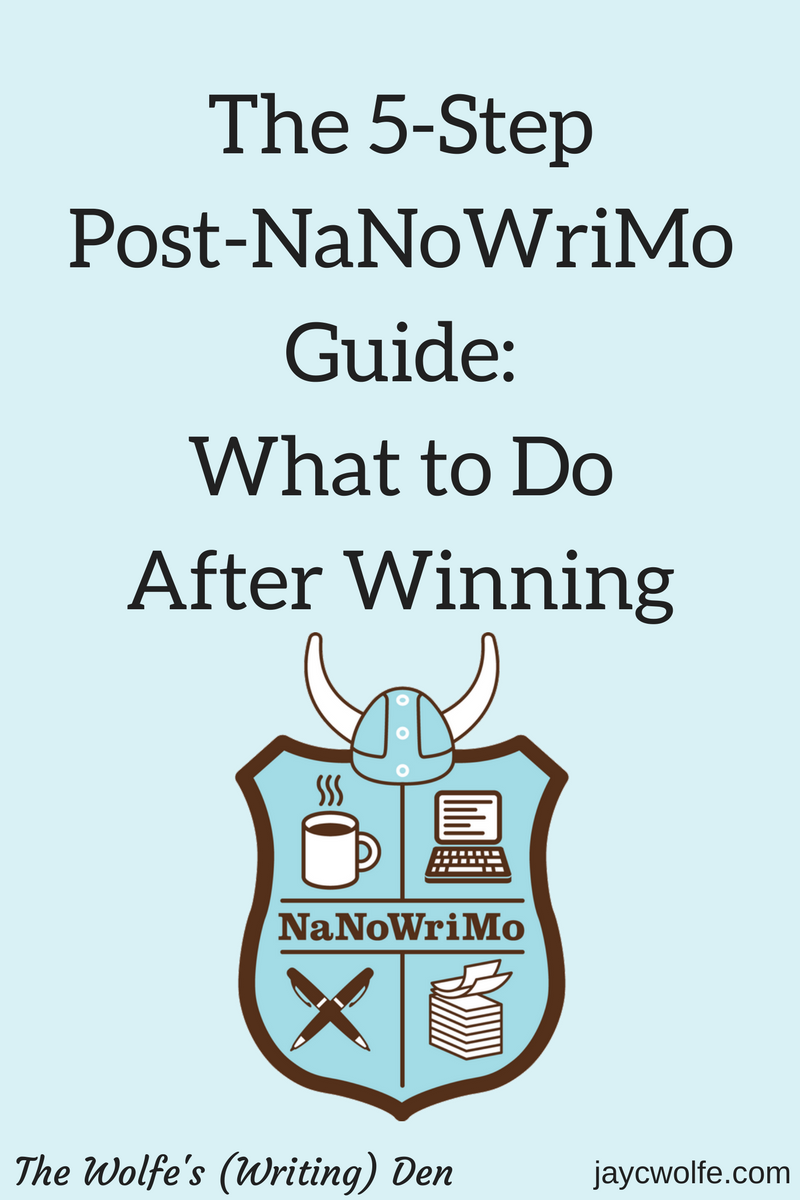
Step 1: Celebrate!
Hey, you just wrote 50,000+ words in a month! That’s nothing to sneeze at! Your novel’s journey is far from over, of course, but you don’t need to worry about publishing or marketing just yet. For now, take a bow and congratulate yourself on achieving something incredible! Go you!

Step 2: Take a break from your manuscript
After 30 days of writing nonstop, you’re probably sick of looking at your manuscript. The good news is that you don’t have to for a while! The writing part is done; now’s the time to let the first draft sit and breathe.
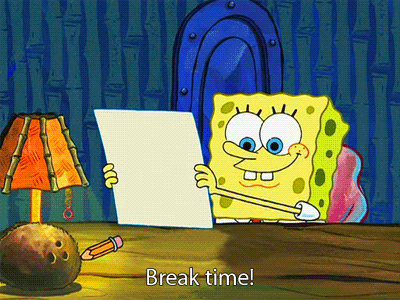
How long exactly varies from writer to writer. Two weeks to a month should be enough, but feel free to take a little more time if you need it (so long as you remember to come back to it). Go back to writing your other stories or just relax with your family over the holiday season. When the time is right to return to your manuscript, you’ll know it.
Step 3: Edit with care
November was the time to rush through your first draft just to get it done. Next comes the editing, which shouldn’t be nearly as rushed.
Once you’ve let your manuscript sit for a while, take it back up for a few thorough rounds of revisions. You don’t have to do it at sloth speed, of course, but don’t feel like you have to pants it like you did in the first round. Polish your work as much as you can until there’s nothing left you can do, then prepare to send it to a professional editor (overlapping with Step 5). Repeat this step every time you get it back until your novel is ready for publication!

Important: Do not skip this step! However proud of it you may (and should) be, your manuscript is not ready to be self-published or submitted to a publisher at the end of November! You must edit it yourself and send it to an editor at least once before declaring your novel complete!
Step 4: Regain your confidence and keep going
The editing phase is the part where many aspiring novelists lose a large chunk of their self-confidence. Whereas writing encourages you to keep moving forward without looking back, editing forces you to confront all the mistakes you made in the first draft. Prepare yourself; it can be a real slap in the face!

Trying to sort out everything from your plot holes and inconsistencies to your run-on sentences and misplaced commas can take a huge toll on your morale, which is why it’s important to step back and take a deep breath. Remember why you wrote this story in the first place. Know that the fear and self-doubt you feel is normal, but you can conquer it. You’ve already come this far, so buckle down and keep going until your final draft is done!
Step 5: Prepare your novel for publication!
Ok, this part actually constitutes a series of steps, but I’ll simplify it here so as not to overwhelm you. Once you’ve done as much as you can yourself, it’s time to reach out to others for help. It may sound scary, especially if you’re an introvert, but there’s no way around it. You can’t make it to the finish line alone!
Get feedback on your early drafts from beta readers: family, friends, and/or online critique groups. Hire an editor to help you polish your manuscript to a readable form (again, this part overlaps with Step 3). Reach out to book agents and publishers (if you’re going the traditional route), or find book formatters, cover designers, and book marketing outlets (if you’re self-publishing).
I know it all seems overwhelming right now, but you can do this! The key is to take it one step at a time. Keep working toward your dream and you’ll be a published author before you know it!

Did you win this year’s NaNoWriMo? Still working on your first draft, or are you ready to start preparing your novel for publication?
Image courtesy of National Novel Writing Month
by Naomi L. | November 27, 2017 | Blog, Word of the Week |
Word: deleterious
Pronunciation: de-lə-TI-ree-əs
Part of Speech: adjective
Definition: causing harm or damage
Source: Oxford Dictionaries
Here’s a word I’ve been meaning to write about for a while. Though I don’t remember where I first learned it, I was recently reminded of it while playing the Pronunciation game in the Elevate – Brain Training app. To be honest, I kind of wish I’d added this adjective to my shortlist of fiction vocabulary sooner; when “harmful” and “damaging” start to become overused, “deleterious” is a good synonym to turn to!
To be “deleterious” is to cause damage or harm. The word arose in the mid 17th century and comes from the Greek adjective dēlētḗrios, meaning “noxious”. This adjective derives from the noun dēlētḗr “destroyer”, which in turn stems from the verb dēléomai “to hurt”.
An easy way to memorize the definition of “deleterious” is to remember that it contains the word “delete”, which means “remove or obliterate”. Notably, Merriam-Webster expands the word’s definition to “harmful, often in a subtle or unexpected way”, so you may want to limit its use to this specific context in your stories. If your characters often harm others or cause damage, “deleterious” may be a good addition to your vocabulary list!
What are your thoughts on this word? Any suggestions for future “Word of the Week” featured words?
by Naomi L. | November 24, 2017 | J.C. Wolfe's Writing, Poetry |
The moment I walk into the kitchen, I’m greeted by warm and delightful smells. We’ve been working on this dinner since this morning and looking forward to it for weeks, and it’ll finally pay off tonight. As I pull the turkey from the oven, the doorbell rings. Mom hurries to answer it, and within minutes, more of our relatives are filing into the living room to greet the other guests. I smile to myself in the kitchen; Grandma and Grandpa never get this many visitors in an entire year! The day passes in laughter and joyful conversation (and maybe the occasional “friendly argument”), until finally evening comes and we sit down to eat. We join hands and give thanks, then we indulge in the most delicious meal of the year. I look around at all the people I love and grin; it’s easy to know what I’m most thankful for!
I always feel blessed
On this day of giving thanks
With my family
Celebrate the joys of life!
Have a Happy Thanksgiving!
Happy belated Thanksgiving to all my family, friends, and readers who celebrated! Have a blessed weekend!
by Naomi L. | November 22, 2017 | Blog, Creative Writing |
Search for tips on how to be a better writer and you’ll find this piece of advice anywhere: read. It’s no secret that reading is good for you, but no one benefits more from reading books than people who want to write their own. Reading can teach you a lot about the craft of writing, so if you really want to improve your skills, start by expanding your library. Books are among your greatest tools for writing success!
So to elaborate on the second point of my list of good writing habits, here are five ways that reading makes you a better writer. Enjoy, and best of luck in your writing career!
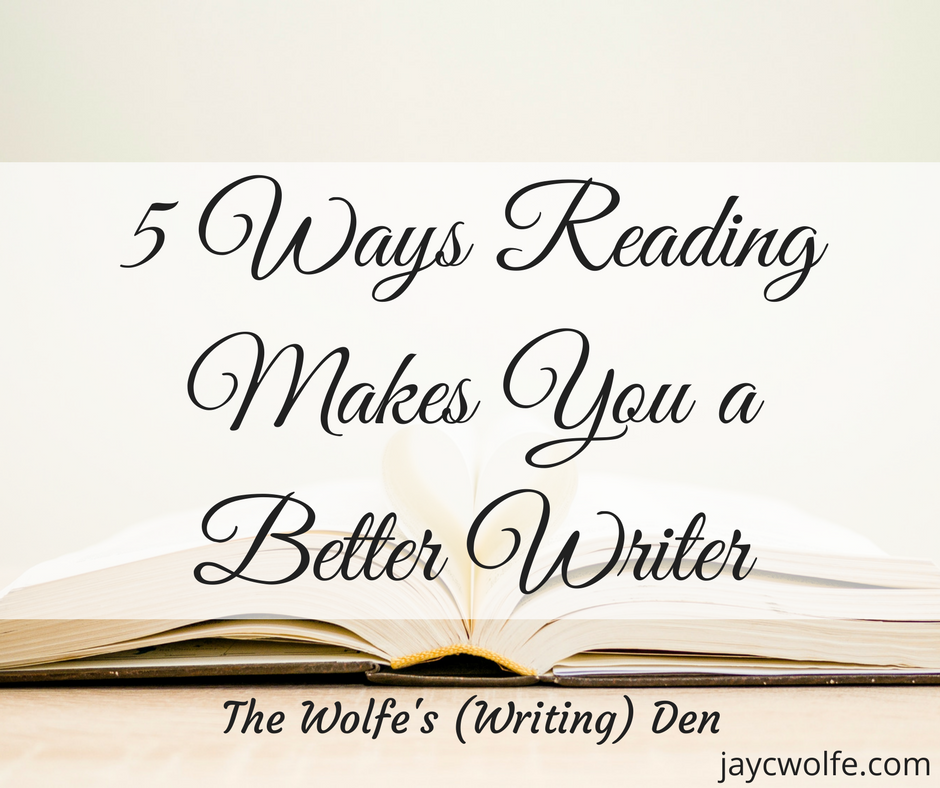
1) Reading teaches you the basics of story structure.
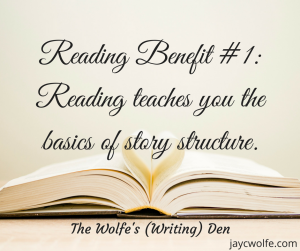 Let’s start with the obvious, shall we? If you want to learn how to write a story, the best way to start is by reading one. It’s as simple as that—so simple, in fact, that we already learned this lesson as children!
Let’s start with the obvious, shall we? If you want to learn how to write a story, the best way to start is by reading one. It’s as simple as that—so simple, in fact, that we already learned this lesson as children!
Think about the last time you read a fairy tale or watched a Disney movie. Notice that these stories always have a very basic plot structure: Hero enters, Villain causes Conflict, Hero fights Villain, Hero defeats Villain, everyone lives Happily Ever After. Doesn’t get any simpler than that, does it?
Dramatic structure refers to these steps as exposition, rising action, climax, falling action, and resolution. Of course, not all stories will follow exactly the same outline—you don’t always need a villain to create conflict, for example—but regardless of content, they will invariably have structure. Reading many books in various genres will reveal what all stories have in common, and that’s the first step toward becoming a master of fiction!
2) You learn what works in a story (and what doesn’t).
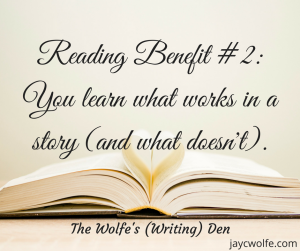 After learning the basics of story structure, the next step is to learn how to write a good story. This is easier said than done, which is why it’s important to read as many good books as possible. Only by understanding what works in other writers’ stories can you figure out how to improve yours.
After learning the basics of story structure, the next step is to learn how to write a good story. This is easier said than done, which is why it’s important to read as many good books as possible. Only by understanding what works in other writers’ stories can you figure out how to improve yours.
Now I know what you’re thinking: If art is subjective and everyone has different tastes, how can you know which books are “good”? The only way to be sure is by reading as many as you can and deciding for yourself what makes a story worth reading. An excellent piece of advice for beginning writers is to start by writing what you like, and you can’t know what you like unless you read!
Of course, bad books can be just as eye-opening as good ones. Who among us hasn’t tried to slog their way through a terribly written novel with flat characters and boring plot points? I know it sounds like torture, but the good news is that reading a bad book isn’t a complete waste of time: by recognizing the flaws that turn you off to someone else’s story, you’ll know what to avoid in yours. In short: Be the next J.K. Rowling, not the next Stephenie Meyer!
3) You get a better sense of how to write in your genre.
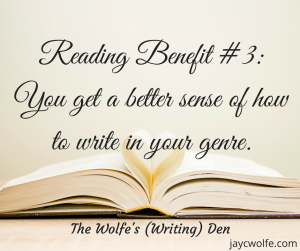 While reading is good in general, reading certain types of stories can be especially beneficial for writers. Every genre has its distinct traits, so reading in your genre of choice can teach you specific writing techniques that you couldn’t pick up from other books.
While reading is good in general, reading certain types of stories can be especially beneficial for writers. Every genre has its distinct traits, so reading in your genre of choice can teach you specific writing techniques that you couldn’t pick up from other books.
If you want to write fantasy, read series like Harry Potter or The Lord of the Rings to learn how to incorporate magic into your world in a logical and believable way. If you choose dystopian fiction, books like 1984, The Handmaid’s Tale, or The Hunger Games will help you understand how to write a future society based on a single drastically different detail. Read Stephen King‘s stories to learn how to write thrilling suspense and horror, or read Jane Austen for a sense of how to write good romantic and historical fiction.
Whatever genre you choose to write in, read those types of books until you feel confident you can write a good story that fits the style… and then keep on reading! So long as you continue indulging in books, you’ll find that you’ll never stop learning for the rest of your writing career. Your stories can only keep getting better!
4) Books expand your imagination.
 When I started reading as a little kid, it opened my entire world to hundreds of new possibilities. My love of books inspired me to start writing when I was nine years old, and I’ve never looked back. I couldn’t tell you how many of my favorite story ideas have come from reading; to this day, no matter what kind of stories I write, I can always find some ideas from books I love and influence from my favorite authors in them!
When I started reading as a little kid, it opened my entire world to hundreds of new possibilities. My love of books inspired me to start writing when I was nine years old, and I’ve never looked back. I couldn’t tell you how many of my favorite story ideas have come from reading; to this day, no matter what kind of stories I write, I can always find some ideas from books I love and influence from my favorite authors in them!
Reading books is a great way to battle writer’s block because books are a rich source of ideas. You don’t have to outright copy other writers’ ideas, of course—in fact, you shouldn’t—but emulating the concepts and styles of writers you admire will help you develop more original ideas of your own in the long run.
So whenever you’re starved for ideas, pick up a novel and see what jumps off the page. You’d be surprised how many creative new ideas are hiding in plain sight on your shelf!
5) Reading replenishes your writing energy.
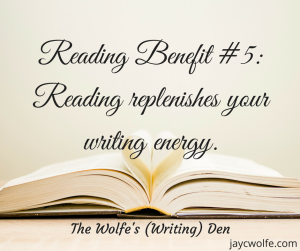 Despite all the previous points on this list, you don’t really need any other reason to read than the fact that it’s fun! Let’s face it, we all need regular breaks from our work, even when that work is our life’s passion (like writing). If you’re just not feeling the words flow, there’s no shame in stepping away from your story for a while to read someone else’s!
Despite all the previous points on this list, you don’t really need any other reason to read than the fact that it’s fun! Let’s face it, we all need regular breaks from our work, even when that work is our life’s passion (like writing). If you’re just not feeling the words flow, there’s no shame in stepping away from your story for a while to read someone else’s!
Reading has been proven to relieve stress and reduce anxiety, which is extra helpful for writers. What writer hasn’t felt stressed after hours of struggling with creative blocks or self-doubt, right? (I know I have.) Even if you are feeling relaxed and productive, fiction is a great escape from mundane routine. We’ve all had to recharge after long stretches of writing, and if you’re going to pause anyway, why not use that time to indulge in a hobby that will help you get better at it?
So the next time you feel drained of the energy to write, try picking up a book. You may find it’s just the thing you need to get you back on your writing streak!
What are your thoughts on these benefits of reading? How has reading made you a better writer?
Photo by Michał Grosicki on Unsplash
by Naomi L. | November 20, 2017 | Blog, Word of the Week |
Word: gramercy
Pronunciation: grə-MƏR-see
Part of Speech: interjection
Definition: used to express gratitude or surprise
Source: Merriam-Webster
“Gramercy for thy courtesy,” replied the Disinherited Knight, “and to requite it, I advise thee to take a fresh horse and a new lance, for by my honour you will need both.”
– Ivanhoe (Sir Walter Scott, 1820)
With Thanksgiving coming up this week, it’s a great time to learn a new word for expressing thankfulness! Today’s Word of the Week entry features a fascinating word I stumbled upon while looking up synonyms for “thankful”. Indeed, this word is so archaic that I couldn’t even find it in my usual source, Oxford Dictionaries, and instead had to look it up in Merriam-Webster. It never hurts to know as many expressions of thanks as possible, but if you truly want to impress someone with an obscure interjection, try “Gramercy!”
“Gramercy” is an interjection used to express surprise or gratitude. The word arose in the 14th century and comes from the Old French expression grant merci, meaning “great thanks”. The former adjective derives from the Latin adjective grandis “grand”, while the latter noun stems from the Latin noun mercēs “reward”.
Today, “gramercy” appears mostly as a proper noun, while the original use of the word as an interjection of gratitude or exclamation of surprise has since become archaic (case in point: the only examples in literature I could find, including the one above, were from stories set in the Middle Ages or earlier). Notably, the word also functions as a noun meaning “thanks” (also archaic), and can be written in the plural form “gramercies”. If you write historical fiction with characters who often need to express thanks or sudden strong feelings, “gramercy” may be an excellent word to work into your stories!
What are your thoughts on this word? Any suggestions for future “Word of the Week” featured words?








 Let’s start with the obvious, shall we? If you want to learn how to write a story, the best way to start is by reading one. It’s as simple as that—so simple, in fact, that we already learned this lesson as children!
Let’s start with the obvious, shall we? If you want to learn how to write a story, the best way to start is by reading one. It’s as simple as that—so simple, in fact, that we already learned this lesson as children! After learning the basics of story structure, the next step is to learn how to write a good story. This is easier said than done, which is why it’s important to read as many good books as possible. Only by understanding what works in other writers’ stories can you figure out how to improve yours.
After learning the basics of story structure, the next step is to learn how to write a good story. This is easier said than done, which is why it’s important to read as many good books as possible. Only by understanding what works in other writers’ stories can you figure out how to improve yours. While reading is good in general, reading certain types of stories can be especially beneficial for writers. Every genre has its distinct traits, so reading in your genre of choice can teach you specific writing techniques that you couldn’t pick up from other books.
While reading is good in general, reading certain types of stories can be especially beneficial for writers. Every genre has its distinct traits, so reading in your genre of choice can teach you specific writing techniques that you couldn’t pick up from other books. When I started reading as a little kid, it opened my entire world to hundreds of new possibilities. My love of books inspired me to start writing when I was nine years old, and I’ve never looked back. I couldn’t tell you how many of my favorite story ideas have come from reading; to this day, no matter what kind of stories I write, I can always find some ideas from books I love and influence from my favorite authors in them!
When I started reading as a little kid, it opened my entire world to hundreds of new possibilities. My love of books inspired me to start writing when I was nine years old, and I’ve never looked back. I couldn’t tell you how many of my favorite story ideas have come from reading; to this day, no matter what kind of stories I write, I can always find some ideas from books I love and influence from my favorite authors in them! Despite all the previous points on this list, you don’t really need any other reason to read than the fact that it’s fun! Let’s face it, we all need regular breaks from our work, even when that work is our life’s passion (like writing). If you’re just not feeling the words flow, there’s no shame in stepping away from your story for a while to read someone else’s!
Despite all the previous points on this list, you don’t really need any other reason to read than the fact that it’s fun! Let’s face it, we all need regular breaks from our work, even when that work is our life’s passion (like writing). If you’re just not feeling the words flow, there’s no shame in stepping away from your story for a while to read someone else’s!
Recent Comments